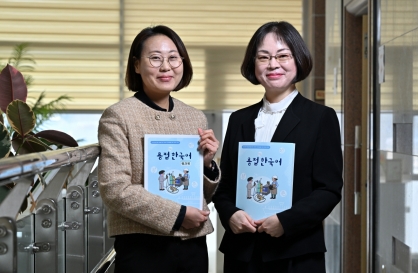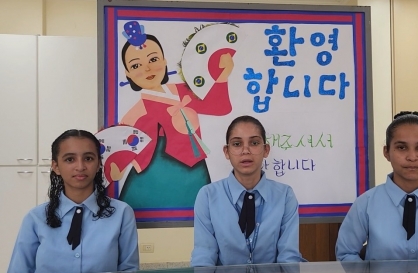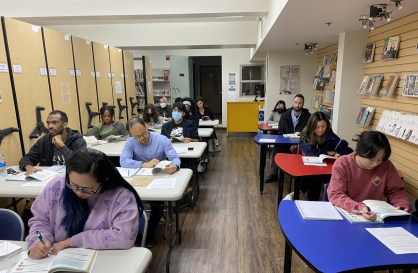Most Popular
Hello Hangeul
-
1
Welding book first in vocational Korean series for foreign labor

-
2
[Korea Beyond Korea] In Sao Paulo, horizons expand for Korean studies
![[Korea Beyond Korea] In Sao Paulo, horizons expand for Korean studies](//res.heraldm.com/phpwas/restmb_idxmake.php?idx=644&simg=/content/image/2023/11/20/20231120000619_0.jpg&u=20231206104853)
-
3
In Brasilia, worldly dreams are born from Korean classes

-
4
Americans seeking to visit Korea learn the language in LA

-
5
[Korea Beyond Korea] Berlin, Europe's Korean Studies hub, nurtures next-gen experts, scholars
![[Korea Beyond Korea] Berlin, Europe's Korean Studies hub, nurtures next-gen experts, scholars](//res.heraldm.com/phpwas/restmb_idxmake.php?idx=644&simg=/content/image/2023/10/18/20231018000929_0.jpg&u=20231023154735)
[Hello Hangeul] 'Korea is squandering opportunities of Hallyu'
Ross King, UBC Korean linguistics professor, says long-term investment needed for Korean language education to catch up with Japanese, Chinese
By Choi Jae-heePublished : Aug. 18, 2023 - 09:01

Ross King, a professor of Korean linguistics who has headed the department of Asian studies at the University of British Columbia since 2008, said overseas Korean studies and Korean language education will never be able to match the scale and influence of Chinese or Japanese studies without serious, sustained investment from Korea.
By Korea, he meant not just the Korean government, which currently covers nearly all funding, which he sees as problematic, King said in an email interview with The Korea Herald.
“The number of major Korean corporations that have made any six-figure (in US dollars) donations in this area can be counted on one hand, and the investments that both the Korean government and Korean companies have made pale in comparison to what the Japanese government and Japanese industry did already in the 1970s, 1980s and early 1990s for Japanese studies,” King, who is based in Vancouver, said.
“It should not be forgotten that Korea and Korean language are competing for attention with China/Chinese and Japan/Japanese, and need to play catch-up,” he stressed.
The biggest problem when it comes to funding issues for Korean studies and language is that the South Korean government provides the lion’s share of funding, and Koreans and Korean companies therefore think that these issues are “not their problem," he added.
Excessive involvement of the Korean government further hampers the organic development of Korean studies overseas, which grows out of and must be tailored to diverse contexts in various countries, he said.
“Of course, we also need better textbooks, learner resources and websites, but Korean government organizations need to abandon the top-down export-model approach of ‘we will train all the teachers and write all the textbooks for you and send them out to you,’” King emphasized.
“Instead, the focus should be on giving centers of excellence outside Korea the long-term resources to get on with these projects themselves -- they know their own teaching environments better.”
Korea is now in a position to make serious, long-term investments and there is a good window of opportunity to make those investments over the next five to 10 years, King said.
Below are edited excerpts from the interview.
Q. What do you think are the most important tasks in Korean language education around the world or in your region, and why do you think so?
Perhaps the biggest threats to overseas Korean studies and Korean language education (KLE) are the facts that (a) the ROK government provides the lion’s share of funding, and (b) Koreans and Korean companies think therefore that these issues are ‘not their problem’ and that it’s all the government’s responsibility.
The number of major Korean corporations that has made any six-figure (in US dollar) donations in this area can be counted on one hand, and the investments that both the Korean government and Korean companies have made pale in comparison with what Japanese government and Japanese industry did already in the 1970s, 1980s and early 1990s for Japanese studies.
The ROK needs to develop more nuanced long-term strategies appropriate for different situations in different countries.
Of course, we also need more and better textbooks, learner resources and websites, but Korean funding and government organizations need to abandon the top-down export-model approach of ‘we will train all the teachers and write all the textbooks for you and send them out to you.’ Instead, the focus should be on giving centers of excellence outside Korea the long-term resources to get on with these projects themselves. It should also not be forgotten that Korea and Korean are competing for attention with China/Chinese and Japan/Japanese, and need to play catch-up.
Korea as an 'advanced nation' now is in a position to make serious investments; now is the time and there is a good window of opportunity now for the next 5-10 years.
Q. Hallyu is undoubtedly among the main factors that drove the rapid increase in demand for learning Korean. What should the Korean government, universities or related institutions work on to keep the Korean language in demand, without the help of Hallyu?
Hallyu has been and continues to be a great opportunity for establishing Korean studies and Korean language education overseas. But so far, Korea is basically squandering that opportunity.
Korea needs to make bold, large and long-term investments in the overseas infrastructure for Korean studies and especially for Korean language education: more money to support students wanting to come to Korea to study, more money for lecturer positions and professorships overseas, etc. The reason Japanese language continues to be so popular around the world, despite J-pop and the Japanese economy being (generally) stagnant and/or declining, is that Japanese government and Japanese industry combined made huge investments in educational infrastructure in the 1970s through the early 1990s. Korea has not done this and is missing a golden opportunity to do so right now.
Q. As language and culture are intertwined, Korean cultural education is considered essential in Korean language education. Could you share your views on the role of Korean cultural education and how it should be done?
Koreans should stop obsessing about ‘how to teach Korean culture’ and stay away from it altogether. Instead, give the experts outside Korea the resources -- funding -- to create such materials themselves. Otherwise it devolves into propaganda, and overseas students know propaganda when they see it.
Koreans are too defensive and protective of their language and culture. There needs to be a shift from exporting these to sharing these -- a shift away from ‘urimal' or 'our' (Koreans') national language, to thinking of Korean as a world language (meaning a language that anybody anywhere can learn for whatever reason).
Q. How do you think the edu tech industry can help the qualitative growth of Korean language education around the world?
Tech-based solutions to Korean language education can only be successful if the overall ecology/infrastructure for Korean language education is robust, and currently it is desperately weak and under-funded. The first step is to create a robustly funded infrastructure with numerous and generous bursaries, scholarships and fellowships for students, and well-funded lecturerships and professorships for teachers. Until such an infrastructure is in place, tech-based solutions will be largely ineffective/wasted. One of the main reasons that tech-based/web-based platforms for learning Korean are so popular right now is that there is (actually) so little KLE available in traditional formats — schools and universities.
Tech is not a magic bullet to be used to bypass investing in basic KLE infrastructure.
This is part of The Korea Herald’s “Hello Hangeul” project which consists of interviews, in-depth analyses, videos and various other forms of content that shed light on the stories of people who are learning the Korean language and the correlation between Korea’s soft power and the rise of its language within the league of world languages. – Ed.













![[Korea Beyond Korea] In Sao Paulo, horizons expand for Korean studies](http://res.heraldm.com/phpwas/restmb_idxmake.php?idx=644&simg=/content/image/2023/11/20/20231120000619_0.jpg&u=20231206104853)


![[Korea Beyond Korea] Berlin, Europe's Korean Studies hub, nurtures next-gen experts, scholars](http://res.heraldm.com/phpwas/restmb_idxmake.php?idx=644&simg=/content/image/2023/10/18/20231018000929_0.jpg&u=20231023154735)







![[Today’s K-pop] Treasure to publish magazine for debut anniversary](http://res.heraldm.com/phpwas/restmb_idxmake.php?idx=642&simg=/content/image/2024/07/26/20240726050551_0.jpg&u=)